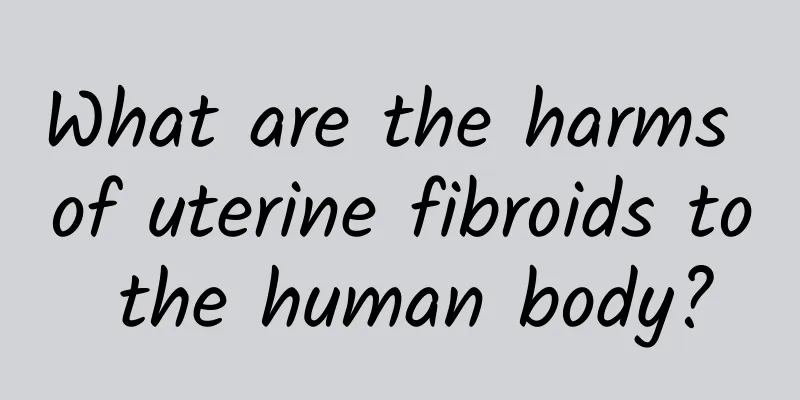What are the harms of uterine fibroids to the human body?

|
Uterine fibroids are a type of benign uterine tumor, composed of uterine smooth muscle tissue, so they are also called "uterine fibroid adenomas". Uterine fibroids are a common and frequently occurring disease that threatens women's health. The disease has no symptoms or is not obvious in the early stages. Clinically, symptoms include prolonged menstruation, shortened cycle, excessive menstrual flow, dark menstrual color, menstrual pain with clots, increased leucorrhea, lower abdominal distension and pain, and breast lumps. So, what are the hazards of uterine fibroids to the human body? Let's listen to the experts' answers below. What are the hazards of uterine fibroids to the human body? Experts answer the hazards of uterine fibroids as follows: (1) Vaginal bleeding: Common symptoms of uterine fibroids, including excessive menstrual flow, shortened and irregular menstrual cycles, and prolonged duration. In terms of the location of the fibroids, intramural fibroids and submucosal fibroids are most likely to experience uterine bleeding, while subserosal fibroids are less likely to cause menstrual changes. (2) Abdominal mass: When the fibroids grow larger, a mass can be felt in the lower abdomen. Especially when the bladder is full, the position of the uterus rises and the mass becomes more obvious. (3) Compression symptoms: Compression of the bladder or urethra, resulting in frequent urination and urination difficulties. Uterine fibroids compress the rectum and cause defecation difficulties. (4) Pain: Severe abdominal pain, accompanied by nausea, vomiting, fever, leukocytosis, and radiating pain caused by tumor compression of nerves (5) Infertility: Tumor growth can cause the uterus to deform, and the obstruction of the fallopian tube entrance can affect the entry of sperm into the fallopian tube, so that the tumor hinders fertilization and egg implantation, which can cause infertility-type abortion. (6) Increased leucorrhea: When there is ulcer on the surface of the submucosal fibroid, there may be increased leucorrhea. When there is infection, there may be purulent leucorrhea. (7) Systemic symptoms: Fibroids can cause menorrhagia, secondary anemia, dizziness, weakness and other symptoms. What are the hazards of uterine fibroids to the human body? The above content has been explained in detail. If you have other questions, please consult our online experts, who will answer you more professionally. Uterine fibroids topic: http://www..com.cn/fuke/zgjl/ |
<<: Three major factors lead to the high incidence of ovarian cysts
>>: Are hormones the cause of ovarian cysts?
Recommend
What tests are necessary for ectopic pregnancy?
Due to the gradual increase in the number of pati...
Body Shaping Tutorial - The Fantasy Thigh Curve (Part 2)
Accidentally ate too much? No time to lose weight...
Which hospital should I go to for menopause?
Menopause is a common gynecological disease in wo...
I just can't lose the extra fat. Will it be effective to try a healthy diet?
"Cell Host & Microbe" published the...
What are the treatments for ovarian cysts?
In the process of treating ovarian cysts, as long...
Make you slim and stylish! Eat this way to get a good physique
A new concept for weight loss: Eat to develop a b...
There are 2 obvious symptoms of cervicitis
Cervicitis is a common gynecological disease in w...
What are the symptoms of early infection of cervical warts in women
Women's bodies are relatively fragile and the...
What department should I go to for primary amenorrhea?
Primary amenorrhea should be checked by a gynecol...
What are the causes of cervical erosion? Check out the 5 common causes of cervical erosion
The occurrence of any disease will cause certain ...
How to completely treat uterine effusion
Moreover, uterine effusion always recurs, which i...
What are the symptoms of cervicitis
Cervicitis is one of the common gynecological dis...
What are the signs of spontaneous abortion?
The main signs of spontaneous abortion include ab...
What should you pay attention to before doing painless abortion surgery? What preparations should you make before doing painless abortion surgery?
1. Choose a professional hospital Before choosing...
Let's learn about the prevention of uterine fibroids
Experts remind that uterine fibroids should be de...









